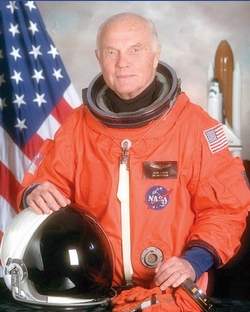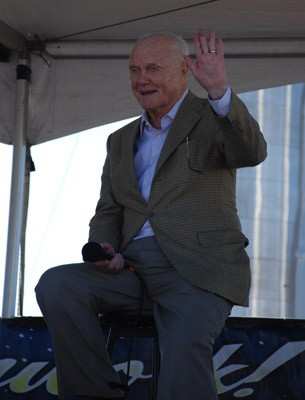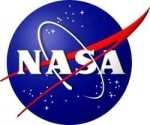John Glenn Says U.S. Should Not Rely On The Russians For
Transportation To ISS
Former Mercury astronaut John Glenn, who later became a United
States Senator from Ohio and participated in a shuttle mission as a
lawmaker, says that NASA should not retire the shuttle until a new
U.S. space transportation system is ready to fly. Otherwise, he
said, the U.S. will be relying on the Russians to transport crew
and supplies to ISS for as long as 10 years.

Senator Glenn On Shuttle Mission
In a nine-page report published by the John Glenn School of
Public Affairs at Ohio State University, Glenn says "to save the
expense of U.S. Shuttle launches (approximately $400 million each)
we are contracting with the Russians for crew and light equipment
launch services to and from our ISS at $55.8 million per
astronaut. Each total crew change of six, then, will cost
nearly $335 million, with future charges expected to increase
substantially.
"In other words, U.S. astronauts will for the next five to ten
years have to move to a Russian launch site in Kazakhstan to train
for final launch preparation on Russian spacecraft, launch, and
return to a grassland landing area at the end of the mission.

John Glenn Aboard Freedom 7
"The Russians do not have a heavy lift capability, so launch
service will be limited to personnel and light equipment.
Heavy “upload” or “download” will be
nonexistent."
Glenn writes that the world’s only heavy lift spacecraft
and the U.S.’s only access to space should stay in operation
until suitably replaced by a new and well tested heavy lift
vehicle. "The Shuttle system is working extremely well, he
says, "has had systems upgrades through the years, and has had
“the bugs” worked out of it through many years of
use. The Shuttle is probably the most complex vehicle ever
assembled and flies in the harshest of environments. Why
terminate a perfectly good system that has been made more safe and
reliable through many years of development? The Shuttles are
the world’s most advanced spacecraft."

While Glenn does not think commercial companies should be cut
out of the equation, he says the companies are, as yet, unproven.
"Under NASA’s very close direction, every manned U.S.
spacecraft has been built by commercial companies," he writes. "In
fact, 83% of NASA’s budget goes to commercial entities.
Depending on commercial companies is not new. That process
has included strong NASA control, oversight and safety
concerns. It is a procedure developed over many years and
with great care. It has worked well. Change should be
made with utmost caution and only if it brings some major
advantage.
"What is new is placing 100% confidence in smaller, less
experienced companies if the Shuttles are retired, with no backup,
for extremely complex missions. I am glad to see
multi-company interest in commercial space development, but at this
early stage of their experience they should be phased in only after
they demonstrate a high degree of competency and reliability,
particularly with regard to safety concerns."
Glenn says in the short term, the shuttle program should be
extended as the key to access to ISS. He says ISS should be used
for long-term training for a potential Mars mission, and that a
fully tested heavy-lift capability to replace the shuttle should be
developed. In the longer term, Glenn says there should be unmanned
exploration of Mars and nearby asteroids, a firm schedule should be
set, and then "go to Mars."

Glenn also says that space exploration can't be done "on the
cheap." "(T)he late astronaut Gus Grissom put it very succinctly
many years ago during a discussion of funding adequacy for our
first manned entry into space on Project Mercury," Glenn writes.
“No bucks, no Buck Rogers.”
 SpaceX to Launch Inversion RAY Reentry Vehicle in Fall
SpaceX to Launch Inversion RAY Reentry Vehicle in Fall Aero-News: Quote of the Day (04.23.24)
Aero-News: Quote of the Day (04.23.24) Aero-News: Quote of the Day (04.20.24)
Aero-News: Quote of the Day (04.20.24) ANN's Daily Aero-Linx (04.20.24)
ANN's Daily Aero-Linx (04.20.24) Aero-News: Quote of the Day (04.21.24)
Aero-News: Quote of the Day (04.21.24)






